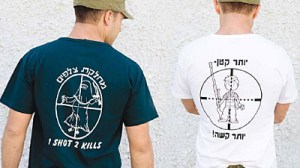Posts Tagged ‘Dehumanization’
Dehumanization & Conflict: How soldiers and societies “make” violence just
These shirts apparently are popular amongst Israeli soldiers these days:

According to Sociological Images, “the shirt on the left shows a pregnant woman, clearly meant to be Arab/Palestinian, in crosshairs and says ‘1 Shot 2 Kills.’ The one on the right has a kid carrying a gun in crosshairs and says “The smaller, the harder,” or maybe ‘the smaller it is, the harder it is.'”
The Israeli-Palestinian conflict has led the two groups become strangers to each other. Through policy, but also though social processes over the decades of violence, both groups have become indifferent to each other’s suffering. Haaretz (via Jörg Lau) recently ran an article about Israeli soldiers’ behaviour during the latest Gaza offensive. One soldier is quoted saying “The lives of Palestinians, let’s say, is something very, very less important than the lives of our soldiers. So as far as they are concerned they can justify [human rights abuses] that way”
Lucy Nusseibeh at opendemocracy.org analyses the emotive effects of the conflict:
The result of the massive and indiscriminate use of force is to diminish Israelis’ as well as Palestinians’ human security. Both are locked in a (very asymmetrical) system that is dominated by fear, victimhood, violence, and (for most) a striking lack of empathy.
What’s happening in Israel and Palestine just as in most conflicts is that the devaluation of the other creates the ideological justification which makes it possible for a group to commit collective crimes. Human rights violations are facilitated by group distinctions made absolute and by the consequent application of separate moral standards for in‐group and out‐group.
There are a few sociological and psychological insights that can explain this pattern:
Personal identity and group identity: When personal identity fades behind an absolutist definition in terms of one’s group, and when this group is excluded from the human family, it is no longer morally unacceptable to harm and kill these individuals.
Victims are never innocent: We can see the role of dehumanisation of victims as central feature of atrocities on all levels. On the psychological perspective, a central theme in the dehumanisation of victims by torturers is the concept of just‐world thinking. It refers to the blaming of victims as ultimately responsible for their sufferings in an act of self‐persuasion. The innocence of the individual cannot be established as the individual cannot not be cleared of the “misdeeds, evil intention, or faults” of her communal groups. A devaluation of the other and diminishing concerns with their suffering is the consequence.
Moral double standards: The dehumanisation and application of negative stereotypes against a communal group may lead to a justification of atrocities by reshaping moral standards and turning evil deeds in good ones: the perpetrator is doing a good thing by eliminating evil people. Out-groups who become victims of atrocities often have a history of victimisation and marginalisation, thereby socially guiding the thought processes of perpetrators.
The role of the state: In modern society, the state is the most important instance of authority, which individuals derive their rights from. To be excluded from the state means being regarded a non‐person, vulnerable to arbitrary treatment.
Sociology of the army: Ideological elements are inherent to any modern army. Armies create systems of ideas and symbols that revolve around discipline and giving up on an individual moral system. Symbols, in‐group fetishism and the channelling of aggressiveness toward the enemy become central elements in this ideology. In this way, separate morals and manners different from the population are established.
For excellent research on how dehumanization is used by soldiers and societies in conflict to rationalize violence, look up H.C. Kelman’s book “The social context of torture”, Mika Haritos‐Fatouras’ work, Anette Smeulers’ interviews with Greek torturers, entitled “What transforms ordinary people into gross human rights violators?”, and Alex Alvarez’ “Destructive Beliefs: Genocide and the Role of Ideology”.
All but Alvarez can be downloaded as PDF for free.
